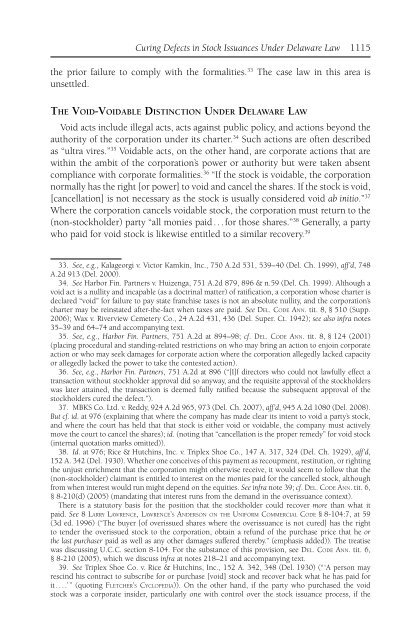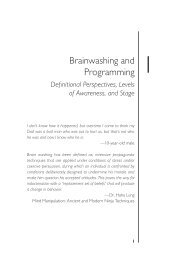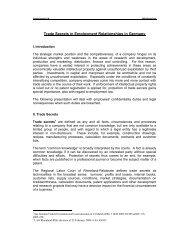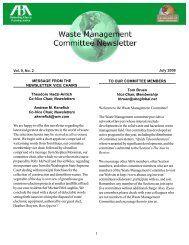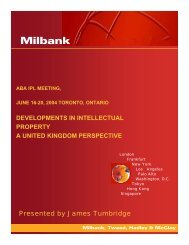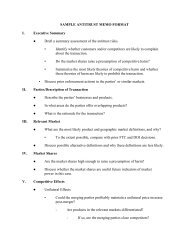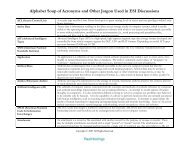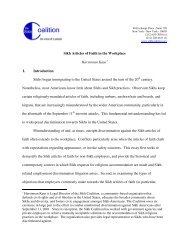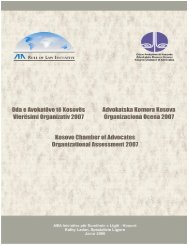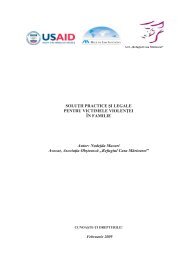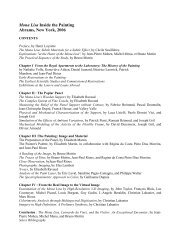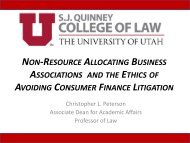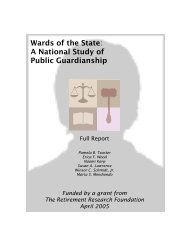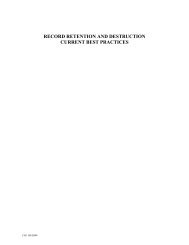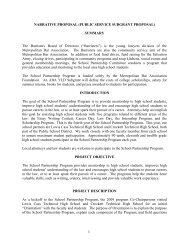Curing Defects in Stock Issuances - American Bar Association
Curing Defects in Stock Issuances - American Bar Association
Curing Defects in Stock Issuances - American Bar Association
Create successful ePaper yourself
Turn your PDF publications into a flip-book with our unique Google optimized e-Paper software.
<strong>Cur<strong>in</strong>g</strong> <strong>Defects</strong> <strong>in</strong> <strong>Stock</strong> <strong>Issuances</strong> Under Delaware Law 1115<br />
the prior failure to comply with the formalities. 33 The case law <strong>in</strong> this area is<br />
unsettled.<br />
THE VOID-VOIDABLE DISTINCTION UNDER DELAWARE LAW<br />
Void acts <strong>in</strong>clude illegal acts, acts aga<strong>in</strong>st public policy, and actions beyond the<br />
authority of the corporation under its charter. 34 Such actions are often described<br />
as “ultra vires.” 35 Voidable acts, on the other hand, are corporate actions that are<br />
with<strong>in</strong> the ambit of the corporation’s power or authority but were taken absent<br />
compliance with corporate formalities. 36 “If the stock is voidable, the corporation<br />
normally has the right [or power] to void and cancel the shares. If the stock is void,<br />
[cancellation] is not necessary as the stock is usually considered void ab <strong>in</strong>itio.” 37<br />
Where the corporation cancels voidable stock, the corporation must return to the<br />
(non-stockholder) party “all monies paid . . . for those shares.” 38 Generally, a party<br />
who paid for void stock is likewise entitled to a similar recovery. 39<br />
33. See, e.g., Kalageorgi v. Victor Kamk<strong>in</strong>, Inc., 750 A.2d 531, 539– 40 (Del. Ch. 1999), aff’d, 748<br />
A.2d 913 (Del. 2000).<br />
34. See Harbor F<strong>in</strong>. Partners v. Huizenga, 751 A.2d 879, 896 & n.59 (Del. Ch. 1999). Although a<br />
void act is a nullity and <strong>in</strong>capable (as a doctr<strong>in</strong>al matter) of ratifi cation, a corporation whose charter is<br />
declared “void” for failure to pay state franchise taxes is not an absolute nullity, and the corporation’s<br />
charter may be re<strong>in</strong>stated after-the-fact when taxes are paid. See DEL. CODE ANN. tit. 8, § 510 (Supp.<br />
2006); Wax v. Riverview Cemetery Co., 24 A.2d 431, 436 (Del. Super. Ct. 1942); see also <strong>in</strong>fra notes<br />
35–39 and 64–74 and accompany<strong>in</strong>g text.<br />
35. See, e.g., Harbor F<strong>in</strong>. Partners, 751 A.2d at 894 –98; cf. DEL. CODE ANN. tit. 8, § 124 (2001)<br />
(plac<strong>in</strong>g procedural and stand<strong>in</strong>g-related restrictions on who may br<strong>in</strong>g an action to enjo<strong>in</strong> corporate<br />
action or who may seek damages for corporate action where the corporation allegedly lacked capacity<br />
or allegedly lacked the power to take the contested action).<br />
36. See, e.g., Harbor F<strong>in</strong>. Partners, 751 A.2d at 896 (“[I]f directors who could not lawfully effect a<br />
transaction without stockholder approval did so anyway, and the requisite approval of the stockholders<br />
was later atta<strong>in</strong>ed, the transaction is deemed fully ratifi ed because the subsequent approval of the<br />
stockholders cured the defect.”).<br />
37. MBKS Co. Ltd. v. Reddy, 924 A.2d 965, 973 (Del. Ch. 2007), aff’d, 945 A.2d 1080 (Del. 2008).<br />
But cf. id. at 976 (expla<strong>in</strong><strong>in</strong>g that where the company has made clear its <strong>in</strong>tent to void a party’s stock,<br />
and where the court has held that that stock is either void or voidable, the company must actively<br />
move the court to cancel the shares); id. (not<strong>in</strong>g that “cancellation is the proper remedy” for void stock<br />
(<strong>in</strong>ternal quotation marks omitted)).<br />
38. Id. at 976; Rice & Hutch<strong>in</strong>s, Inc. v. Triplex Shoe Co., 147 A. 317, 324 (Del. Ch. 1929), aff’d,<br />
152 A. 342 (Del. 1930). Whether one conceives of this payment as recoupment, restitution, or right<strong>in</strong>g<br />
the unjust enrichment that the corporation might otherwise receive, it would seem to follow that the<br />
(non-stockholder) claimant is entitled to <strong>in</strong>terest on the monies paid for the cancelled stock, although<br />
from when <strong>in</strong>terest would run might depend on the equities. See <strong>in</strong>fra note 39; cf. DEL. CODE ANN. tit. 6,<br />
§ 8-210(d) (2005) (mandat<strong>in</strong>g that <strong>in</strong>terest runs from the demand <strong>in</strong> the overissuance context).<br />
There is a statutory basis for the position that the stockholder could recover more than what it<br />
paid. See 8 LARRY LAWRENCE, LAWRENCE’S ANDERSON ON THE UNIFORM COMMERCIAL CODE § 8-104:7, at 59<br />
(3d ed. 1996) (“The buyer [of overissued shares where the overissuance is not cured] has the right<br />
to tender the overissued stock to the corporation, obta<strong>in</strong> a refund of the purchase price that he or<br />
the last purchaser paid as well as any other damages suffered thereby.” (emphasis added)). The treatise<br />
was discuss<strong>in</strong>g U.C.C. section 8-104. For the substance of this provision, see DEL. CODE ANN. tit. 6,<br />
§ 8-210 (2005), which we discuss <strong>in</strong>fra at notes 218–21 and accompany<strong>in</strong>g text.<br />
39. See Triplex Shoe Co. v. Rice & Hutch<strong>in</strong>s, Inc., 152 A. 342, 348 (Del. 1930) (“ ‘A person may<br />
resc<strong>in</strong>d his contract to subscribe for or purchase [void] stock and recover back what he has paid for<br />
it . . . .’ ” (quot<strong>in</strong>g FLETCHER’S CYCLOPEDIA)). On the other hand, if the party who purchased the void<br />
stock was a corporate <strong>in</strong>sider, particularly one with control over the stock issuance process, if the


